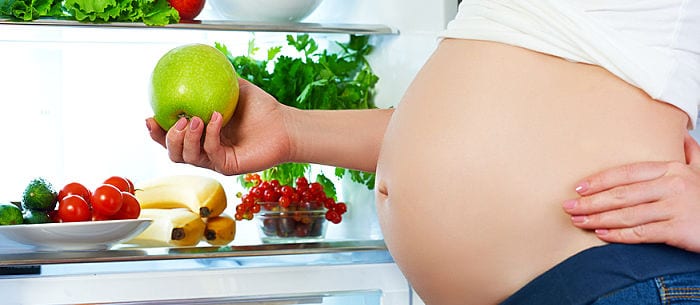You’re pregnant. You’re hungry. And you know your diet during pregnancy might not be quite the same as what you’d usually eat. What should you eat — or rather, what should you try to avoid?
First of all, it’s not time to start eating like a mid-season linebacker. Even though some moms welcome the idea that they can eat more than usual now, Cindy Crowninshield, a licensed registered dietitian and health and nutrition counselor, advises women against eating for two during the first trimester. “Adequate weight gain for the optimal birth of the baby and a well-nourished mother are the primary goals of pregnancy,” she explains.
“Women make the mistake of eating for two during the first trimester to achieve this goal. There is no need for additional calories during the first trimester.” Pregnancy weight-gain goals are based on one’s height and pre-pregnancy weight. See the United States Department of Agriculture (USDA)’s Choose My Plate website to find appropriate pregnancy weight-gain goals and meal plans to help you with your diet during pregnancy.
Besides paying attention to how much you’re eating, of course, you need to think about what you’re eating. Your diet during pregnancy can affect the health of your baby now and for the rest of his life, asserts natural health expert Dr. Doni Wilson, a doctor of naturopathic medicine, certified professional midwife and author of “The Stress Remedy.” You have the opportunity during your pregnancy to change not only the future of your baby but your grandchildren, too!” she says.
In addition, here’s a list of some don’ts during pregnancy to keep in mind while you’re carrying your precious cargo, as outlined by the two experts:
- Don’t Eat Sushi
Raw fish has a higher likelihood of containing parasites and bacteria that can cause severe digestive issues.
- Don’t Eat Certain Cheeses
Some cheese carries a risk of Listeria monocytogenes (commonly known as Listeria). This bacteria can cause listeriosis, an illness which can have severe consequences, such as premature birth or miscarriage. Avoid unpasteurized soft cheese, such as queso blanco and queso fresco, according to the FDA, in addition to any cheese made from unpasteurized milk and cheese that isn’t aged at least 60 days.
- Don’t Drink Alcohol or Smoke
The reason is obvious — your baby will be exposed to those same toxic substances.
- Limit Caffeine
It passes through the placenta to your baby. It can also cause decreased blood flow to the placenta, which is harmful. Some studies say caffeine can cause miscarriage while others say that’s not true. Limit your caffeine intake to 200 milligrams a day, according to the American Congress of Obstetricians and Gynecologists.
- Avoid High Fructose Corn Syrup and Processed Foods as much as Possible
They stress your metabolism and affect your baby’s metabolic function, says Dr. Wilson, adding that they can possibly set the stage for later-in-life problems like diabetes and heart disease before your baby is even born.
- Try Not to Skip Meals
When your blood sugar is low, it triggers a cortisol hormone response in your body that affects your baby. Even if you’re queasy, you’ll probably feel better if you eat small, frequent meals of nutritious foods.
- Be Wary of Medications, Especially Antibiotics
Sometimes medications are necessary, but whenever you can prevent catching a cold or use natural therapies (check with your health care provider before taking any over-the-counter or natural remedies) to recover, it will be better for you and your baby, the experts say. But don’t avoid antibiotics if you have an infection and need them. Just be sure to discuss all your options with your physician.
- Don’t Overdose on Refined Carbs and Empty Sugars
Foods like white breads, white rice, sugary sweets and sodas rush into your bloodstream causing blood glucose levels to spike. These spikes may result in heavier newborns who are at greater risk of being overweight later in life.
- Don’t Get Dehydrated
Make sure to drink at least 12 eight-ounce glasses of water a day. A pregnant woman needs more water than the average person. Water affects normal formation of the placenta and the amniotic sac.
- Don’t Eat Fish With High Levels of Methyl Mercury
This means avoid swordfish, shark, king mackerel and tilefish. The chemical methyl mercury can pass through the placenta to the baby. Mercury can affect a baby’s developing brain, kidneys and nervous system, say the experts.
- Avoid Drinking Some Types of Herbal Teas. Speak with your doctor about tea products to make sure the ingredients are safe.
Choosing the right foods can help you avoid (or at least not aggravate) conditions that complicate a pregnancy, including high blood pressure, kidney problems, autoimmune disorders, diabetes, morning sickness, hyperemesis gravidarum, heartburn, constipation, hemorrhoids, food aversions/intolerance and food cravings, says Crowninshield. (Of course, there’s no guarantee that you will avoid all of these, but you can certainly give yourself a good chance by eating well!)
Start cutting the undesirable foods from your diet six months prior to conception to get your body ready for pregnancy. “Don’t assume that all of a sudden you can start implementing these steps overnight when you haven’t had a history of doing so,” Crowninshield says. It’s easier to change your habits gradually instead of all of a sudden, isn’t it?
And here’s What Not to Eat While Pregnant.
Laura Richards is a Boston-based freelance writer and the mother of four boys, including a set of identical twins. She has written for numerous parenting publications and is president of On Point Communications.





